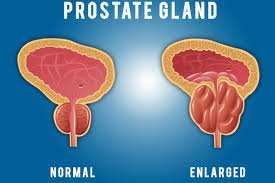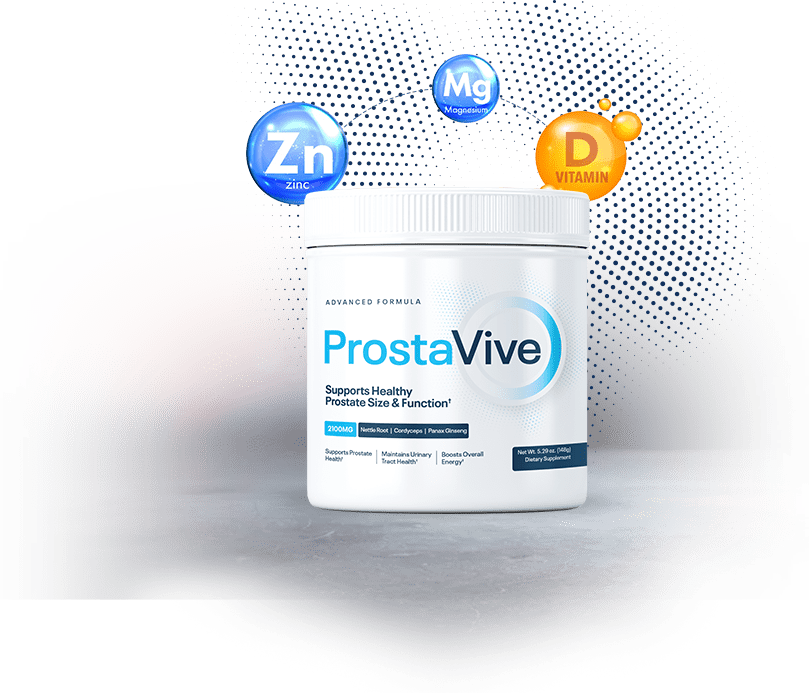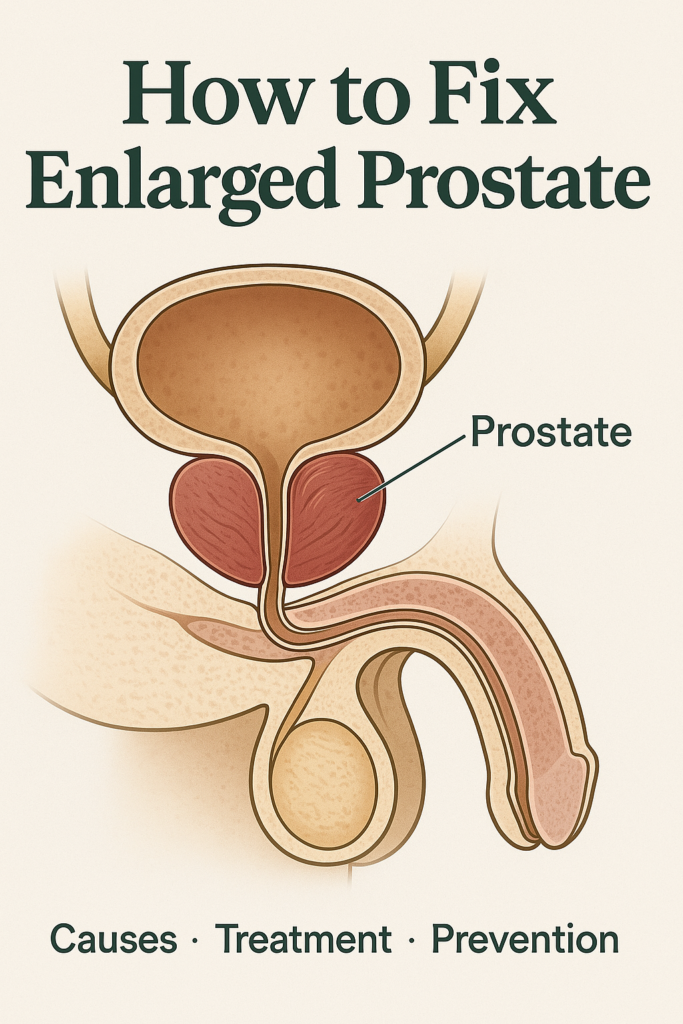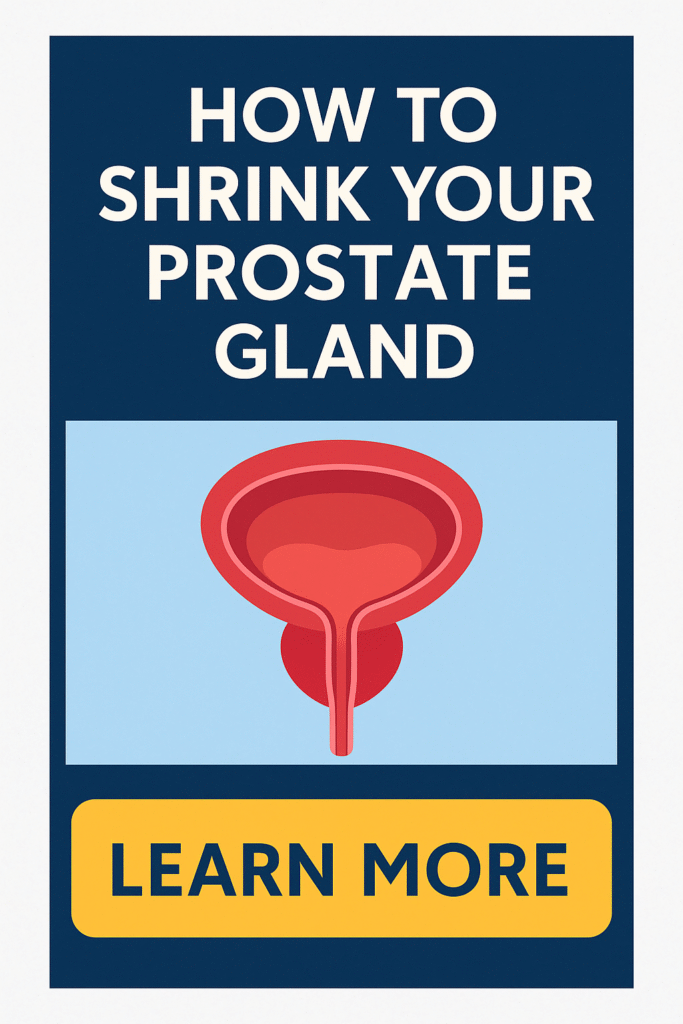How To Reduce Prostate Inflammation

Imagine reclaiming comfort and control over your urinary functions and enhancing your quality of life by learning how to reduce prostate inflammation. Prostate inflammation, or prostatitis, is not just an inconvenience; it can significantly impair daily life through pain and frequent urination. This hindrance calls for everyone to actively seek solutions that alleviate such distress and promote overall well-being.
For many, understanding the intricacies of prostate inflammation, such as differentiating between prostatitis and BPH, is crucial in identifying appropriate medical and natural interventions. Addressing the root causes—from bacterial infections to dietary factors—allows for a comprehensive approach that blends antibiotics, anti-inflammatory medications, and natural supplements. This multifaceted strategy promises not only symptom relief but also long-term prostate health.
This article will navigate you through various methods and lifestyle adjustments aimed at reducing prostate inflammation. We’ll explore medical options, natural remedies, dietary changes, and the role of healthcare professionals in crafting tailored treatment plans. With a focus on empowering you through knowledge and available resources, we’ll ensure you are well-equipped to manage and optimize your prostate health effectively.
Understanding Prostate Inflammation
Prostate inflammation, or prostatitis, is a condition that can significantly impair one’s urinary function and overall quality of life. Understanding how to reduce prostate inflammation is crucial, as it can lead to painful urination, frequent urination, and discomfort in the pelvic area. The inflammation of the prostate can stem from various causes, and its impact varies among individuals. Distinguishing factors like infection or autoimmune responses is vital for targeted treatment. Unlike Benign Prostatic Hyperplasia (BPH), which involves the enlargement of the prostate gland due to age without necessarily being inflamed, prostate inflammation can be more acute and distressing, demanding prompt attention.
Common Causes of Prostatitis
Prostatitis is triggered by both bacterial and non-bacterial causes, and identifying the root cause is crucial for effective treatment. Bacterial prostatitis, caused by a bacterial infection in the prostate, often leads to symptoms like acute urinary pain and fever. This type of prostatitis calls for medical interventions such as antibiotics to eliminate the bacterial infection and reduce inflammation. On the other hand, non-bacterial prostatitis, which might result from autoimmune conditions or nerve damage, doesn’t arise from an infection, thus requiring different approaches, such as lifestyle changes or physical therapy. Understanding these causes is key to addressing inflammation and improving prostate health.
Differentiating Between Prostatitis and BPH
Differentiating prostatitis from BPH is essential as both conditions affect the prostate gland but require distinct management approaches. Prostatitis is characterized by an inflamed prostate, often leading to sudden, severe symptoms including pelvic pain and urinary complications. Treatment focuses on addressing inflammation and potential infections. Knowing how to reduce prostate inflammation involves both medical interventions and lifestyle adjustments. Conversely, BPH involves a non-inflammatory enlargement that primarily causes gradual urinary tract symptoms due to pressure on the urethra. While both conditions disrupt normal urinary function, prostatitis often demands swift treatment due to its inflammatory nature, whereas BPH typically involves long-term management strategies.
Inflammation Isn’t Inevitable
Discover how natural support like ProstaVive can help reduce inflammation before it turns into a bigger problem. Prevention starts here.
Medical Treatment Options

When it comes to addressing inflammation of the prostate, understanding your medical treatment options is crucial. Prostate inflammation, or prostatitis, can severely impact urinary function and overall quality of life, causing symptoms like frequent urination and pelvic pain. Various treatment strategies exist, helping manage the condition effectively and leading to a healthier prostate. Whether caused by a bacterial infection or other factors like an enlarged prostate or prostatic hyperplasia, a tailored approach involving medications and therapies can provide significant relief.
Antibiotics for Bacterial Prostatitis
For cases of bacterial prostatitis, antibiotics remain a cornerstone of treatment. They target and eradicate the bacteria causing the inflammation, thereby alleviating symptoms and preventing the infection from spreading. While antibiotics are effective for this specific type of prostatitis, not all forms of the condition respond to such treatment. In cases where inflammation is not due to bacterial causes, incorporating natural anti-inflammatory strategies can offer additional benefits and enhance overall prostate health.
Use of Anti-inflammatory Medications
Anti-inflammatory medications, particularly nonsteroidal anti-inflammatory drugs (NSAIDs), play a critical role in reducing prostate inflammation. These medications help alleviate pain and improve urinary symptoms by decreasing swelling within the prostate. However, long-term use of NSAIDs can pose risks such as gastrointestinal issues or cardiovascular side effects. This concern has led many to explore natural solutions, which offer a safer alternative with fewer adverse effects while still managing inflammatory prostatitis effectively.
Exploring Physical Therapies
Physical therapies provide a compelling option for reducing prostate inflammation, especially for those who prefer non-pharmacological treatments. Pelvic floor therapy and physiotherapy are particularly beneficial, focusing on reducing pain and enhancing urinary function through targeted exercises and techniques. These therapies work by strengthening the pelvic muscles and improving circulation, which can decrease inflammation and discomfort. As a complementary treatment, physical therapy offers a holistic approach to managing the complex symptoms of chronic prostatitis and related conditions, helping improve both physical and mental well-being.
Looking for an Alternative to Pills?
If you’re hesitant about meds or surgery, ProstaVive offers a natural support option without harsh side effects.
Natural Remedies and Supplements

Addressing prostate health is essential for maintaining a comfortable, active life, especially as men age. Those experiencing symptoms such as frequent urination, painful urination, or pelvic pain often look for effective ways to manage these issues. Understanding “How To Reduce Prostate Inflammation” can significantly improve urinary function and enhance the overall quality of life. Natural remedies are increasingly favored because of their minimal side effects and potential for sustainable results. Among these remedies, user-friendly supplements like ProstaVive, known for its science-backed formula, stand out. By incorporating natural ingredients designed to reduce inflammation, ProstaVive and similar supplements can provide long-term relief for many individuals struggling with prostate-related discomfort.
Benefits of Saw Palmetto
Saw Palmetto is a powerful ally in the fight against prostate inflammation. Known for its anti-inflammatory properties, it also inhibits the formation of dihydrotestosterone (DHT), a hormone linked to prostate enlargement. These dual benefits make Saw Palmetto a sought-after ingredient in supplements like ProstaVive. The compound’s ability to reduce inflammation and potentially slow the growth of the prostate gland can aid those seeking effective solutions for their urinary symptoms. As a core component of ProstaVive, Saw Palmetto not only addresses existing inflammation but also supports the maintenance of a healthy prostate, making it an ideal choice for those concerned about long-term prostate health.
Role of Stinging Nettle
Stinging Nettle has been embraced by traditional medicine for its role in managing inflammation and supporting urinary flow. This herbal remedy is particularly valuable for those with benign prostatic hyperplasia (BPH) or those experiencing urinary tract symptoms. Many leading prostate formulas include Stinging Nettle due to its efficacy in reducing inflammation and easing urinary difficulties. By incorporating this herb into supplements, users may experience not just relief from symptoms, but also an improvement in the overall health of the prostate. Its natural properties complement other ingredients, creating a well-rounded approach to prostate care. As a result, Stinging Nettle continues to be an integral part of holistic strategies aimed at sustaining urinary health and reducing inflammation in the prostate.
Not All Supplements Are Equal
ProstaVive combines top ingredients like Saw Palmetto & Lycopene in one formula. Clinically backed and trusted by thousands.
Dietary Adjustments for Inflammation Reduction

Addressing prostate inflammation is crucial for maintaining a healthy lifestyle and reducing the risk of more serious urological issues. Understanding “How To Reduce Prostate Inflammation” involves not just medical intervention but also lifestyle shifts, particularly in diet. Consuming the right nutrients can remarkably decrease inflammation, improving urinary function and overall quality of life. An anti-inflammatory diet can support the prostate by curtailing swelling and irritation, which often result in uncomfortable urinary symptoms like frequent urination and painful urination.
Increasing Omega-3 Intake
Omega-3 fatty acids are renowned for their powerful anti-inflammatory properties, making them essential for reducing prostate inflammation. These beneficial fats can be sourced from fatty fish such as salmon, mackerel, and sardines, as well as plant-based options like flaxseed and chia seeds. Increasing your intake of omega-3s can significantly lower inflammation within the body, leading to healthier prostate function. Those with a diet rich in omega-3s often experience fewer symptoms of conditions like chronic prostatitis and enlarged prostate, thereby enhancing their overall quality of life.
Incorporating Anti-inflammatory Foods
To combat prostate inflammation effectively, incorporating anti-inflammatory foods into your diet is vital. Foods rich in antioxidants and other inflammation-fighting compounds can help reduce symptoms and promote a healthier prostate. Tomatoes, known for their high lycopene content, play a significant role in this effort. Berries, with their potent antioxidants, and cruciferous vegetables like broccoli and cauliflower are similarly effective. These foods are often recommended alongside prostate supplements like ProstaVive, which has garnered positive reviews for its ability to support prostate health.
The Benefits of Green Tea
Green tea is a powerful ally in reducing prostate inflammation due to its high polyphenol content, which provides substantial antioxidant benefits. These natural compounds help neutralize free radicals, thus reducing inflammation and supporting prostate health. Regular consumption of green tea has been linked to lower levels of inflammation, thereby improving urinary tract function and reducing the risk of prostate complications over time. As such, green tea is a common feature in many prostate health regimens, making it an easy addition to a diet aimed at mitigating inflammation and promoting a healthy prostate.
Healthy Diet + Targeted Support = Results
Prostate-friendly foods work best when combined with daily support. ProstaVive helps boost dietary changes naturally.
Lifestyle Changes for Prostate Health

Prostate inflammation can significantly impact urinary function and overall quality of life, making it essential to address this issue effectively. If you’re wondering how to reduce prostate inflammation, you should consider incorporating lifestyle changes that promote a healthy prostate. These modifications not only alleviate symptoms associated with an enlarged prostate or chronic prostatitis but also support long-term prostate health. Adopting a healthy routine can minimize urinary tract symptoms, reduce pelvic pain syndrome, and improve your quality of life. Proactive measures, such as regular exercise and proper hydration, are crucial in curbing inflammation and ensuring the prostate gland functions optimally.
Importance of Regular Exercise
Regular exercise plays a vital role in maintaining prostate health and reducing inflammation. Physical activity increases circulation throughout the body, including the prostate area, which helps in alleviating symptoms of prostatic hyperplasia and other types of prostatitis. Improved circulation aids in the effective delivery of nutrients and oxygen, promoting healing and reducing inflammatory responses. Engaging in regular physical activity can also lower the risk of bacterial infections that contribute to conditions like acute and bacterial prostatitis, further protecting the prostate gland.
Moreover, exercise helps in maintaining a healthy weight, a crucial factor in managing prostate inflammation. Excess body fat can exacerbate inflammation, so engaging in movement to shed extra pounds becomes decisive. Additionally, the psychological benefits of exercise, such as reduced stress and improved mood, indirectly support prostate health by mitigating stress-related inflammation. Therefore, integrating consistent exercise into your routine, such as walking, cycling, or swimming, can be a compelling strategy in your arsenal against urinary symptoms and prostate-related discomfort.
Ensuring Proper Hydration
Adequate hydration is essential for reducing irritation in the urinary tract and facilitating the detoxification of waste products from the body. Drinking sufficient water helps dilute urine, reducing the likelihood of painful urination and bladder discomfort associated with prostate inflammation. Staying hydrated ensures the urinary system operates smoothly, diminishing the risk factors associated with urinary tract infections and inflammatory prostatitis.
To effectively support your prostate health, it is advisable to limit the intake of caffeine and alcohol. These substances can exacerbate urinary tract symptoms, like frequent urination, by irritating the bladder and prostate, compounding inflammation. Instead, prioritize water and herbal teas, which have calming effects on the urinary tract and complement the body’s natural detox processes. By making mindful choices surrounding your fluid intake, you can significantly influence the health of your prostate and enhance your overall well-being.
Daily Habits, Daily Relief
Small routines can yield big results. Reinforce your healthy lifestyle with ProstaVive‘s powerful natural ingredients.
Consulting Healthcare Professionals

Addressing prostate inflammation is crucial for maintaining urinary function and overall quality of life. Chronic prostatitis, a prevalent type of prostatitis, can cause significant discomfort and may lead to urinary tract symptoms such as frequent urination and pelvic pain syndrome. As such, it is imperative to understand “How To Reduce Prostate Inflammation” effectively. Consulting healthcare professionals is the first step towards identifying the right treatment options and ensuring the best approach tailored for your condition. Professional advice is key to distinguishing between different types of prostatitis, such as bacterial prostatitis and nonbacterial prostatitis, and determining the most effective strategies for each.
Conducting Accurate Diagnoses
Accurate diagnosis is vital for effectively reducing prostate inflammation and enhancing prostate health. To properly diagnose prostatic hyperplasia or any form of inflammatory prostatitis, healthcare professionals conduct a series of tests. Urine samples and PSA tests are commonly used to detect the presence of bacterial infections or cancerous cells. Blood tests can offer additional insights into inflammation levels within the prostate gland. Through these diagnostic measures, a medical practitioner can confirm the presence and severity of inflammation, thereby guiding appropriate treatment.
A rectal exam is another tool employed by healthcare professionals to examine the prostate gland physically. This exam helps assess any abnormalities and is an essential part of identifying symptoms of prostatitis and underlying issues such as acute prostatitis. Proper diagnosis ensures that the treatment plan addresses the specific type of prostatitis and aligns with the patient’s unique health profile.
Developing Personalized Treatment Plans
Once a precise diagnosis is made, developing a personalized treatment plan is crucial to effectively managing prostate inflammation. Treatment options can vary widely based on individual factors such as the severity of symptoms, age, and personal preferences. A tailored solution not only targets the root cause of inflammation but also incorporates interventions that the patient is most comfortable with.
Medical treatment may involve antibiotics if bacterial infections are the culprits behind the inflammation. In cases of nonbacterial prostatitis, lifestyle adjustments, such as regular sitz baths and prostate massage, might be recommended to alleviate discomfort and manage urinary tract symptoms effectively. ProstaVive, a natural supplement option, is increasingly gaining attention due to positive reviews and its non-invasive nature. Including such supplements in a treatment plan can complement conventional methods, offering a holistic approach to prostate health.
When designing a treatment plan, it is crucial to factor in patient-specific details alongside professional guidance. This ensures a comprehensive strategy that not only alleviates current symptoms but also promotes a healthy prostate in the long run. By combining medical expertise and natural supplements like ProstaVive, patients can achieve better outcomes and improve their quality of life significantly.
Doctors Approve Natural Routes
Many experts suggest supplements like ProstaVive alongside clinical treatment — especially for inflammation control.
Importance of Regular Check-ups and Monitoring
Addressing prostate inflammation is vital for maintaining overall prostate health and enhancing quality of life. This condition can significantly impact urinary functions, causing frequent, painful urination and pelvic discomfort, which in turn affects daily activities and sleep quality. Learning “How To Reduce Prostate Inflammation” is essential not only for easing these troublesome symptoms but also for preventing potential complications such as chronic prostatitis or prostatic hyperplasia. Regular check-ups and monitoring are crucial strategies in maintaining prostate health and promptly addressing any emerging issues. By keeping a vigilant eye on prostate health, individuals can make informed decisions about their care and lifestyle, reducing the risk of severe outcomes.
Engaging in Routine Prostate Exams
Routine prostate exams are a cornerstone of proactive prostate health management. Annual screenings become increasingly important, particularly for men over the age of 50 or for those exhibiting symptoms of prostatitis. These exams, which often include a physical or rectal exam, are pivotal in early detection of prostate issues, including inflammation and potential infections. Identifying changes in the prostate early can lead to more effective treatment options and better management of symptoms.
Regular exams aid in monitoring the prostate gland’s condition, catching any signs of enlargement or abnormalities. This preventive approach can help mitigate the development of chronic conditions and reduce the risk of prostate cancer. By committing to these yearly check-ups, individuals empower themselves with critical information about their prostate health, allowing them to adjust lifestyle habits or seek medical treatments as necessary. This vigilance is especially beneficial in minimizing complications linked to both acute and chronic prostatitis.
Participation in Clinical Trials
Participation in clinical trials offers individuals access to cutting-edge care and innovative treatment options for prostate inflammation and related conditions. These trials often explore new therapeutic avenues, including alternative solutions like natural supplements, which can be particularly appealing for those seeking less invasive treatment approaches. Engaging in these studies may provide access to the latest advancements before they become widely available, offering potential benefits for managing and reducing prostate inflammation.
Clinical trials also contribute significantly to the broader understanding and treatment of prostate health issues. Participants play a crucial role in advancing medical knowledge, which can lead to the development of more effective treatments and prevention strategies. For patients, especially those with chronic conditions or unmet treatment needs, involvement in these studies presents an opportunity to actively participate in the pursuit of improved care solutions. Thus, clinical trials not only benefit the individual but also contribute to the greater medical community by enhancing understanding and treatment of prostate-related conditions.
Track Progress with Smart Support
Routine monitoring paired with daily use of ProstaVive may help you notice improvements faster — and maintain them longer.
Staying Informed on Prostate Health
Prostate health is a crucial aspect of men’s overall well-being, and understanding the causes and solutions for issues like prostate inflammation is vital. Addressing inflammation in the prostate can significantly improve urinary function and quality of life, making it an essential health concern for many. One of the key questions is “How To Reduce Prostate Inflammation?” as this condition can disrupt daily activities with symptoms such as frequent urination and painful urination. Reliable solutions, including ProstaVive—an increasingly recommended supplement by experts—can aid in promoting a healthier prostate. Staying informed about these options and maintaining a proactive approach can alleviate discomfort and prevent more serious conditions.
Exploring Research from the Cleveland Clinic
The Cleveland Clinic is recognized for its cutting-edge research and holistic approach to prostate health. Their findings often spotlight natural and herbal remedies as beneficial options for managing prostate inflammation. Herbal treatments are gaining traction in the medical community due to their potential to alleviate symptoms without the side effects often associated with conventional medications. The Cleveland Clinic emphasizes considering a comprehensive plan that includes both medical and lifestyle interventions for optimal prostate health.
In addition to herbal supplements, the clinic also acknowledges the importance of a healthy diet, regular exercise, and stress management as integral parts of a holistic care strategy. Such an approach not only targets inflammation but also supports overall well-being. For those exploring treatments to reduce inflammation, natural remedies offer a complementary avenue alongside traditional medical treatments, facilitating a balanced and informed health strategy.
Read Our Detailed ProstaVive Review
You’re reading up — now take the next step. ProstaVive supports men who stay informed and take control.
Supporting Prostate Health Naturally with ProstaVive
Prostate health is a critical aspect of overall male wellness, significantly affecting urinary functions and quality of life. Ignoring prostate inflammation can lead to symptoms like frequent and painful urination, hindering daily activities and disrupting sleep. Thus, learning How To Reduce Prostate Inflammation is essential for maintaining a comfortable and active lifestyle. Introducing ProstaVive, a gentle, science-backed supplement designed to support prostate health and naturally reduce inflammation. This supplement offers a 60-day money-back guarantee, providing a risk-free opportunity to experience its benefits. It’s a natural solution worth considering for any man looking to improve his prostate health seamlessly.
Ready for Real Relief?
ProstaVive offers a science-backed, natural formula to fight prostate inflammation and support better urinary health. Try it today, risk-free!
What Is ProstaVive and How Does It Work?
ProstaVive is an innovative supplement crafted to naturally improve prostate health without the need for a prescription. It’s specifically formulated to address inflammation, which often underlies issues such as prostatitis and an enlarged prostate. This supplement harnesses the power of nature to alleviate inflammation, thereby improving urinary function and comfort for those with prostate challenges. Users have reported significant relief from prostate inflammation symptoms and urinary discomfort. The robust 60-day money-back guarantee allows users to try ProstaVive without financial risk, reinforcing its credibility and commitment to user satisfaction.
Key Natural Ingredients Backed by Science
The effectiveness of ProstaVive is grounded in its core natural ingredients, each scientifically validated for its role in supporting prostate health. Saw Palmetto is a powerful component known for reducing inflammation and improving urinary symptoms of an enlarged prostate. Lycopene, a potent antioxidant found in tomatoes, contributes to reducing oxidative stress, crucial for long-term prostate health. Zinc plays a vital role in cellular function and immune support, helping to maintain a healthy prostate gland. These ingredients are meticulously selected for their maximum bioavailability, ensuring that the body absorbs and utilizes them effectively to promote a balanced prostate environment.
Ingredients That Matter
ProstaVive contains clinically supported herbs like Saw Palmetto and Lycopene, carefully chosen to naturally reduce inflammation and restore comfort.
User Experiences and Positive Outcomes
User testimonials and reviews reflect the positive impact ProstaVive has had on many men’s lives. Commonly reported benefits include a noticeable decrease in night-time urination and an improvement in urinary flow, leading to enhanced comfort and convenience. Many users have found a new lease on life, free from the constant interruptions of frequent urination and discomfort. The success patterns emphasize ProstaVive’s potential to be a transformative part of a prostate health regimen. As many have already experienced substantial improvements, there’s a clear invitation to join the ranks of those who have taken control of their prostate health journey.
Thousands Trust ProstaVive
Real men. Real results. Reduced urgency, better sleep, more comfort. Join the many who’ve transformed their prostate health with ProstaVive.











